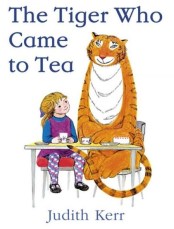I’ve written before about the fantastic project by Canadian novelist Yann Martel, which he began in 2007 – sending a book every two weeks to the-then Canadian Prime Minister, Stephen Harper. Less a didactic process of recommending good-reads, it provides a fascinating insight into the ways in which literature, politics and social commentary can inform each other.
I tried something similar in 2009, during a period in which Gordon Brown, who was then PM, appeared to need advice to shake a certain inertia during a period when he and his Party were in the doldrums. I suggested that he should stop reading elegies in country churchyards and read Michael Rosen on chocolate cake instead!
So, what of our current PM and her main challenger in 2017?
We haven’t seen Theresa May much during the General Election campaign – she has been keeping out of the public eye, speaking at carefully-choreographed, invitation-only events. I think of her as a slightly bookish-teenager, hiding away in her bedroom, reading stories about Britain before the common market. I can imagine her a member of the Enid Blyton society, or reading books by Arthur Ransome. The story which I think resonates most for me about May is ‘The Tiger who came to tea‘ – the children’s story about a family which has a visit from an apparently polite and friendly Tiger. There are various Freudian interpretations which one could make – but for me, that image of a little girl being befriended by a Tiger reminds me of the picture of Theresa May and Donald Trump holding hands: a homely and familiar scene behind which lurks a dangerous and frightening force.


And what of Jeremy Corbyn? His image is that of a ‘man of the people’, amiably
wandering around talking openly to voters. He reminds me of  Wordsworth, whose early poems tell stories of chance happenings and meetings with ordinary folk – such as the Old Man Travelling, or the Female Vagrant or the Idiot Boy – some of the greatest poems in the English language. But, I’m also reminded of that great mis-guided Spanish hero, Don Quixote – a man on an emotional mission, who ends up tilting at Windmills and running away from musketeers.
Wordsworth, whose early poems tell stories of chance happenings and meetings with ordinary folk – such as the Old Man Travelling, or the Female Vagrant or the Idiot Boy – some of the greatest poems in the English language. But, I’m also reminded of that great mis-guided Spanish hero, Don Quixote – a man on an emotional mission, who ends up tilting at Windmills and running away from musketeers.
Taking on Yann Martel’s mantle, I’d be recommending books which address some of the major political challenges facing politicians in 2017 – among other things: inequality, mass migration of people, and the challenges of globalisation and nationhood. Here is a selection of ideas:
- Lanark, by Alisdair Gray. I think of this as Scotland’s answer to Ulysses; it’s an epic, surrealist, story of social, emotional and economic upheaval in a non-worldly place resembling Glasgow. Reading it might help navigate the complexities of Brexit and the potential break-up of the United Kingdom.
- To better-understand the UK’s place in the world, reading Moby Dick would be instructive: the quest for the whale and the power of the planet.
- John Berger – who died earlier this year – would help bring an understanding of the human condition: A Seventh Man on migration, for example; or A Fortunate Man on the life of a country doctor (noting the inspiration of Wordsworth).

